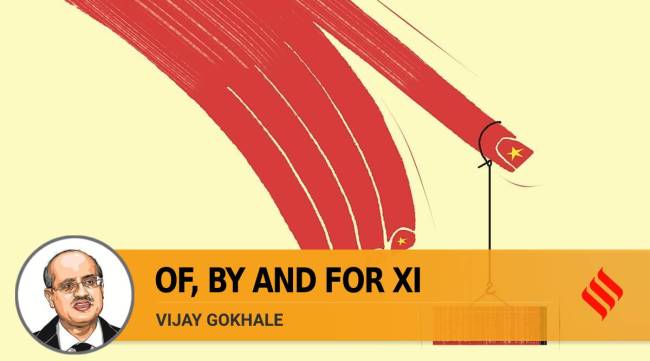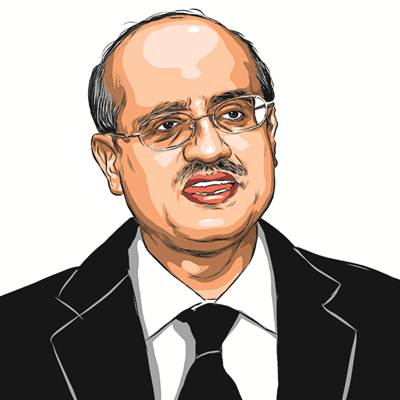Opinion A reign with no reins: China of, by and for Xi Jinping
Xi Jinping is putting in place ideological, constitutional and coercive instruments that will keep him in power for the foreseeable future. India will have to deal with him from a long-term perspective
 The West kept hoping that Xi would return to an economically liberal path. (Illustration by C R Sasikumar)
The West kept hoping that Xi would return to an economically liberal path. (Illustration by C R Sasikumar) The 20th Party Congress ended, predictably, on October 22 with Xi Jinping remaining as the General Secretary of the Communist Party of China (CCP) for a third five-year term. Before every party congress, the western world wonders who’s in and who’s out and educates the rest about what it might mean. It is time that Indians do our own thinking. We are neither in a strategic competition for global power with China as America is, nor do we have Europe’s dilemma over China’s economic potential and its political values. Rather, we are a significant neighbour with a troubled relationship that needs to be managed correctly. A proper reading of the congress from our national perspective is, therefore, a good starting point to analyse what happened in Beijing.
Personnel changes are significant, but the key point is that Xi has political control. He determines the norms for political office. Age, experience and performance are no longer barriers. Xi’s new core team, the Politburo Standing Committee, is loyal and, in turn, they enjoy his trust. There is no successor. The amendments to the CCP constitution have cemented Xi’s position as the supreme leader. Two key phrases — “Two Safeguards” (safeguard the unified centralised leadership of the Central Committee and safeguard Xi as the core of the central committee) and “Two Establishes” (establish Xi as the core of the party and his thought as the guiding principle) guarantee his power.
The party has justified Xi’s continuation as general secretary by declaring that his continued leadership is vital when China is facing “a situation of unparalleled complexity, a fight of unparalleled graveness and tasks of unparalleled difficulty”. His guidance is thus deemed necessary to “remove serious hidden dangers in the party, the country and the military and set the rejuvenation of the Chinese nation on an irreversible historical course”. The message is messianic in its implications.
References to the hidden dangers within the system suggest that there might be internal challenges and, hence, the CCP constitution has been amended to add certain “obligations” on all party members to fully align with Xi. These mandate the compulsory study of party history and Xi Thought at all levels, stricter provisions related to political integrity and party discipline, and new tasks for the commissions on discipline inspection. In other words, the precision instruments to enforce the “obligations” have also been sharpened. In short, Xi is steadily putting into place the ideological, constitutional and coercive instruments that will keep him in power for the foreseeable future. India will have to deal with him from a long-term perspective.
Xi has declared victory over poverty, thereby claiming that China has achieved the first of two “centenary” goals. His broad priority from hereon is to “build China into a great modern socialist country that is prosperous, strong, democratic, culturally advanced, harmonious, and beautiful”. Shorn of jargon, Xi’s pursuit of the second centenary goal is intended to place China at the apex of global power by 2049. The two key challenges are the acute structural problems in the economy, which he characterised as “imbalanced, uncoordinated, unsustainable”, and the “inadequate & insufficient response capacity” of the national security framework for tackling major risks. He prioritises these because, in his own words, “external attempts to suppress and contain China may escalate at any time”. His report is a clarion call for China to gear up for an all-out race with America. International commentators are discussing whether China has peaked because of its falling demographics and growth rate. Xi believes that China will win this race, and this is what should matter in our assessment when we shape our own economic and national security agendas.
The West kept hoping that Xi would return to an economically liberal path. Such hopes have been dashed again. Xi says that the Party will remain the central pillar of the economy by making the public sector get stronger, grow bigger and do better. The private sector will continue to play its role, but he has said that he will intensify efforts to uproot corruption in “sectors with high concentration of power, funds and resources”. His focus will be on improving China’s capacity to secure strategic resources, building next-gen industries, internationalising the renminbi, and concentrating on original R&D in core sectors. In short, he is hardening the domestic supply chains to withstand the shock of western sanctions.
There are both opportunities and challenges for India. The West may finally understand that they need to diversify their investments and markets, opening real possibilities for India in technology collaborations and supply chains. Yet, we should be aware that as the global economic war turns ugly, our star performing sectors — pharmaceuticals, automobiles, electronics — are still heavily dependent on Chinese imports and they may use economic coercion to force choices upon us.
On national security policy, Xi refers to “immense risks and challenges” and exhorts his people to “show firm determination to never yield to coercive power”. He has set the deadline of 2027 to elevate the PLA to a world-class standard, which has implications for India. There are three in particular. First, China will establish a strong system of strategic deterrence or, in short, it intends to escalate its nuclear force both qualitatively and quantitatively. This might radically alter the strategic balance in South Asia. Second, the PLA will increase the proportion of “new domain forces” and “unmanned intelligent combat capabilities” to win “local wars”. Shorn of mystery, this means that China’s build-up on the LAC is likely to continue unabated. Third, that maritime forces will be enhanced, which presumes a semi-permanent presence in the northern Indian ocean by 2027. It is clear that China is preparing to confront the US if it must, and warning others that bloc formations targeting China will also be in the cross-hairs. The Twenties will see a fundamental shift in the security situation around both our land and maritime perimeters simultaneously. Xi spoke of attaching priority to forging friendships with neighbours and to converging interests with them. Diplomacy will be needed to test if this is normal China double-speak, or something that might be further explored.
After the Party Congress, the experts will minutely analyse what the central message was. It is important to recognise that the Party Congress is a domestic political exercise and Xi is conveying that, in him, “the party has found a second answer to the question of how to escape the historical cycle of rise and fall”. This has been the communist party’s nightmare. It is a weight on Xi’s shoulders. He has signalled that he intends to fulfil his historical destiny.
Gokhale is author of After Tiananmen: The Rise of China and former Foreign Secretary




